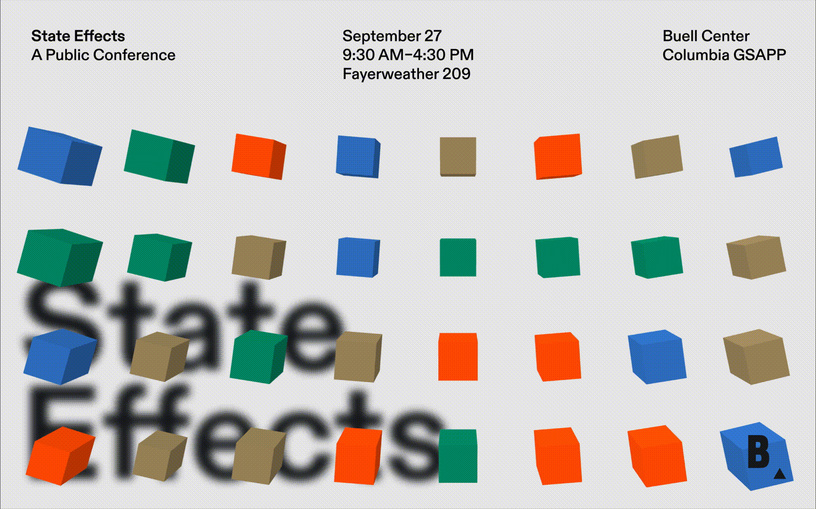A Public Conference Hosted by GSAPP’s Temple Hoyne Buell Center for the Study of American Architecture.
What is the relationship between that entity we call “the state” and the built environment? To reframe this question, this one-day conference draws from recent literature that has challenged the conception of the state as an autonomous monolith that exerts uniform power on the world around it. What does it mean to understand the state, instead, as an entity that gains its coherence from its effects? How can architecture, understood as a state effect, help re-conceptualize the state as a central conceit in modernity?
For in-person attendance (general public welcome): Email buellcenter@columbia.edu to RSVP. If you do not have an active Columbia ID card, please RSVP by September 25 with the following information: your full name as written on a government-issued ID and your preferred email address. You will receive an email from Columbia University Public Safety containing a QR code, which you will be asked to present along with a matching ID, at campus gates (116th St and Broadway or Amsterdam Ave). Please allow a few extra minutes to pass through campus security.
For virtual attendance, register for the webinar here.
9:30 am
IntroductionLucia Allais & Zeynep Çelik Alexander
10 am – 1 pm
Morning SessionCole Roskam (HKU), “The Extra-State Effect of the People’s Palace, Kinshasa, Zaire, 1973-1979”Daniel Abramson (BU), “Federalism, Finance, and Fictions of Postwar American Government Architecture”Sophie Cras (Paris 1), “Designing the Perfect Market”Yara Saqfalhait (Columbia), “The Idealism and Realism of Saḳızlı Ōḥānnes: Aesthetics and Political Economy in the Late Ottoman Empire”Response: Rosalind Morris (Columbia)
2 – 5 pm
Afternoon SessionSheila Crane (UVA), “Unmapping Land, Law, and Sovereignty in Casablanca”Sonali Dhanpal (Columbia), “Housing Empire’s Subjects: The Moral Panic Over Race in Post-War Britain”Brodwyn Fischer (UChicago), “Informalization and the State in Urban Brazil”Brian Larkin (Columbia), “The Political Economy of Light”Response: Bruno Carvalho (Harvard)
5 pm Reception
Organized by GSAPP’s Temple Hoyne Buell Center for the Study of American Architecture.


